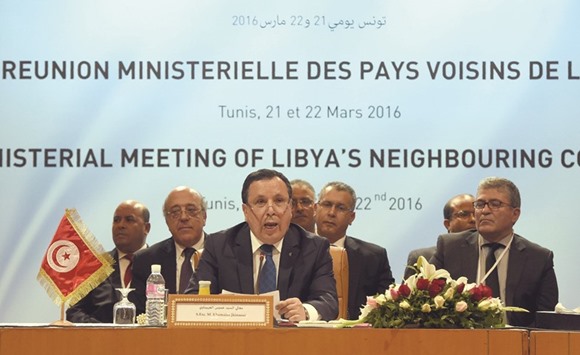
Tunisian security forces check vehicles near the Tunisian customs post at the Ras Jedir border crossing with Libya, south of the town of Ben Guerdane, yesterday after it was reopened after a two-week closure in response to a deadly militant attack on a town near the frontier.
Authorities also decided to reopen the border with Libya, which had been closed two weeks ago after a deadly raid on the frontier town of Ben Guerdane which they blamed on the militant group.
Analysts and officials have said the raid was an attempt by the extremist organisation to spread its influence from Libya across the border into Tunisia.
The North African nation, the birthplace of the Arab Spring, has suffered from a wave of militant violence since the 2011 revolution that ousted longtime dictator Zine El Abidine Ben Ali.
IS claimed brazen attacks last year on the National Bardo Museum in Tunis and a beach resort, and a November suicide bombing in the capital, that killed in total 59 tourists and 12 presidential guards.
After the November attack targeting the presidential guards authorities declared a state of emergency which President Beji Caid Essebsi decided to extend for the third time yesterday.
Essebsi “has decided after consultations... to extend the state of emergency for a period of three months from March 23,” two months more than the previous extension, his office said in a statement.
The measure comes just two weeks after seven civilians and 13 security personnel were killed in coordinated militant attacks in Ben Guerdane.
Forty-nine militants were killed by security forces in clashes and raids after the attacks.
On Monday night the interior ministry said authorities had arrested 12 members of a cell suspected of having helped “terrorists” travel to Libya.
Ben Guerdane, home to 60,000 people, has been under nighttime curfew since the March 7 attacks, but two crossings with Libya were reopened yesterday.
The reopening is seen as crucial for cross-border trade, a mainstay of the economy of Tunisia’s largely impoverished southern provinces.
It came as Tunisia hosted talks with other countries that share borders with Libya on the threat posed by the growing influence of IS in the lawless oil-rich North African nation.
Libya has had two rival administrations since mid-2014 when the recognised government was forced from Tripoli to the far east after a militia alliance including Islamists overran the capital.
The UN is pushing Libya’s rival politicians to accept a unity government, created under a power-sharing deal sealed by the rival parties in December.
The deal has not been formally endorsed by lawmakers from either side, effectively blocking the unity government from operating.
IS has taken advantage of the political vacuum to expand its influence in Libya and spread it further beyond.
Tunisian Foreign Minister Khemaies Jhinaou opened yesterday’s meeting with a plea to delegates from Algeria, Egypt, Sudan, Niger and Chad for greater co-operation to end Libya’s chaos.
“The proliferation of terrorist groups and their control of certain regions in Libya is a source of extreme concern... a danger for Libya’s people.. and for the stability of its neighbours,” he said.
Libya’s UN envoy Martin Kobler told the meeting that the “terrorists are taking advantage of political divisions”, urging support for the UN-backed unity government.
Libya’s neighbours said in a statement at the end of the Tunis talks that a unity government must be installed quickly in Tripoli to counter the threat of militants.

